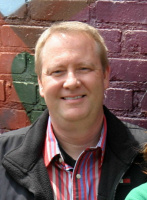
The emerging church movement, such as it is, defies classification. There are pastors like Erwin McManus of Mosaic, who are "emerging" because he started a church in LA in several venues, most notably a nightclub called The Mayan
http://www.npr.org/templates/story/story.php?storyId=14501673However, he is simply a Southern Baptist sheep in wolf's clothing.
Then there is the man that CT magazine calls pastor provocateur, Mark Driscoll in Seattle. This is "the cussing pastor" from
Blue Like Jazz fame. His theology is John MacArthur but his style is Adam Sandler. Sort of a second-class Reformation.
On the other hand, there is not just emerging churches and emerging pastors, but the emergent movement. Put McLaren and Bell in that camp. They have overreacted to the pain of growing up fundy. Can I give you a synopsis of their UFO theology (it’s out of this world)?
1. The nature of the movement is based on conversation, not preaching. They do not want to decide or determine but facilitate sharing. Excuse me, provoke thought. The more voices the more stressful, excuse me, the more successful you are. Any final theological decisions made are kept strictly personal, thank you.
2. The nature of Biblical authority is such, that if not rewritten, it must at least be reinterpreted by every generation.
3. Certain previously accepted assumptions and arguments (conservative evangelical ones) should be rejected out of hand. The cardinal sin is to be pre-postmodern (if you don't understand what I am saying you already deserve to go to purgatory). Anything that smacks of post-enlightenment modernism is not modern enough. Yet the way to be postmodern is to go back to pre-modern elements. In emergent churches this may include liturgical rituals (candles, incense, and contemplative New Age practices). In scholarship it requires one to be familiar with patristics (the study of the thought of the early church fathers).
Okay, let me make a correction. Emergent is probably more of a fad than a movement. It will be self-limiting in evangelical circles for some key reasons.
A. They tend to play fast and loose with doctrine, and often develop a loyalty to the novel. Let's put it more generously. They are great at describing all sides of an issue, but stutter in delineating the right side.
B. They can spend a lot of time in talk with little substantive action (substantive in terms of advancing the mission defined biblically).
Ray Anderson offers some sane theological guidance in his new book, "
An Emergent Theology for Emerging Churches." He draws a distinction between the terms emergent/emerging that most readers and leaders in that movement probably won’t espouse, but I like his thesis. The church at Antioch had a mission to establish churches. Jerusalem sadly did not.
Along the way from Jerusalem to Antioch, Anderson points out that in an "emerging theology"
1. The difference is about theology, not just geography
2. It is about Christ, not Christology
3. It's about the Holy Spirit, not just spirituality
4. It's about the right gospel, not the right way to do church
5. It's about kingdom living, not kingdom-building
6. It's about the work of God as well as the word of God
7. It's about the church ahead of us, not the one behind us
Anderson is Senior Professor of Theology at Fuller Seminary in California. His book is endorsed by emergent activist Brian McLaren, which is an amazing thing given Brian's muddled thoughts on doctrinal issues. He and Rob Bell kind of go together as obscurantly reactionary anti-fundamentalists. One hopes that someday they will get over being hurt by "the man."




